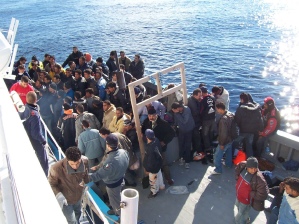Written by Eleonara Monscalco
Twenty-four Afghan immigrants lost their lives in the Black Sea on 3 November in yet another attempt to make the dangerous journey to Europe. It is likely that the immigrants were trying to reach the Bulgarian and Romanian coasts on their makeshift boat when tragedy struck.
Turkey is another country deemed popular for Asian and African immigrants to begin their European lives in the hope of a better future. In 2013 a boat sunk off of the coast of Turkey killing five people, which was attempting to reach Greece. What is clear is that tragedies such as the former continue to take place and immigrants searching for a better life in Europe, despite such tragedies, continue to make the dangerous voyage overseas.
Even with European efforts, the number of illegal immigrants has actually doubled in recent years. The main causes for this increase include widespread poverty, the Syrian civil war and political instability in North Africa. A substantial amount of immigrants also come from Afghanistan, Eritrea, Albania and Chechnya. The immigrants pay sums of money to smugglers in their search for freedom and better living standards.
Those bearing the brunt of the doubling of illegal immigration in Europe include Italy and Greece, due to their positioning in the Mediterranean Sea. As a result, ‘Operation Mare Nostrum’ was launched in October 2013 by the Italian government to patrol international waters, as well as to rescue eventual boats approaching European coasts. Due to Italy’s efforts, over 100, 000 people have been saved from impending tragedy and more than 700 smugglers have been arrested. However, due to the high costs of the operation, Italy can no longer afford to pay for the operation; €114m has been spent so far and the country has turned to its European counterparts for help in the fight against its immigration problem.
The European Union has finally announced a joint operation to combat the issue. The European Agency for the Management of Operational Cooperation at the External Borders of the Member States of the European Union (Frontex) has launched ‘Operation Triton’, costing the entity around €3m a month. The operation will focus on a narrower area than -Italy did before. However, Operation Mare Nostrum will not cease immediately and will continue for another two months in combination with Operation Triton.
Unfortunately, despite the EU’s efforts to solve the crisis, the measures taken are simply not enough to stop the dangerous overseas illegal immigration journeys. Moreover, not all the countries that make up the EU have financially committed to Operation Triton, whilst Finland, Spain, Portugal, Iceland, the Netherlands, Latvia, Malta and France will provide the equipment needed, other countries like Germany and the United Kingdom have refused to help with the situation. The two European heavyweights in particular have received widespread criticism for their actions.
British Minister of State of the Foreign and Commonwealth Office, Joyce Anelay, believes that the fight against immigration should take place on the territories the immigrants come from. According to Anelay, Triton will not discourage smugglers from organising more journeys. Instead, the operation will have the reverse effect and push more people to emigrate towards Europe, knowing that they will be picked up by international ships. The problem, according to the British, needs to be addressed at the source in order to find a solution.
Kate Allen, the General Director of Amnesty International, stated on that the British government’s decision to not help in the effort to stem overseas illegal immigration, “is a very dark day for the moral standing of the UK”.
There is hope that Operation Triton will be successful in stemming illegal immigration and preventing further loss of life. Whether the UK is to be a part of the venture in the future and whether the operation is to be successful remains to be seen.
Photo credit: Ticketautomat

